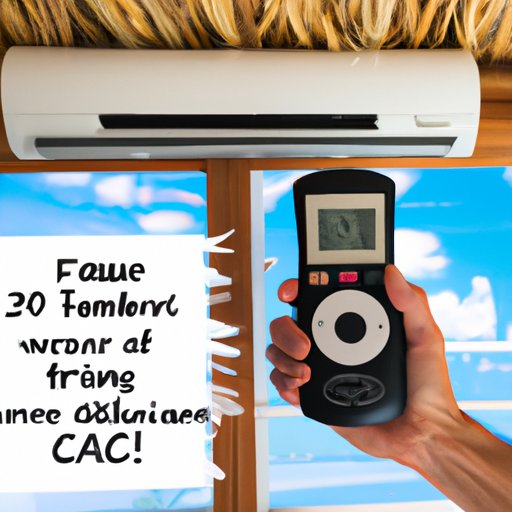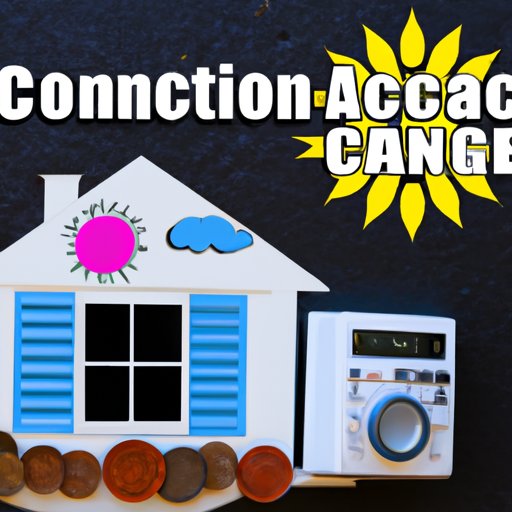Introduction
When it comes to taking a vacation, many people wonder if it’s okay to leave their air conditioner (AC) off while they are away. After all, it can be tempting to want to save money and energy by not running the AC while you’re gone. But is it really a good idea to leave your AC off while on vacation? In this article, we’ll explore the pros and cons of leaving your AC off while on vacation, and provide tips for keeping your home comfortable and safe while you’re away.

Pros and Cons of Leaving Your AC Off While on Vacation
The potential benefits of leaving your AC off while on vacation include saving money on energy costs, as well as potentially reducing your carbon footprint. However, there are also some risks associated with turning off your AC while you’re away. Some of these risks include damage to your home due to excessive heat, or mold and mildew growth from excess humidity.
Potential Energy Savings
One of the most obvious benefits of leaving your AC off while on vacation is the potential for energy savings. By not running your AC while you’re away, you can save money on your electricity bill. This can be especially beneficial if you plan to be away from home for an extended period of time.
Risk of Damage to Home
Although there are potential energy savings associated with leaving your AC off while on vacation, there are also some risks involved. For example, if your home is located in a hot climate, it can become excessively hot while you’re away. This can lead to damage to your home, such as warped flooring, peeling paint, and even mold growth. In addition, if your home has high humidity levels, this can also lead to mold and mildew growth.
Tips for Maintaining Your Home’s Temperature While You’re Away
If you decide to leave your AC off while on vacation, there are some steps you can take to help maintain your home’s temperature. These include using window coverings, setting up a timer, and utilizing fans.
Using Window Coverings
Using window coverings is one of the best ways to keep your home cool while you’re away. Heavy curtains and blinds can block out the sun’s rays, which can help keep your home cooler. If possible, try to close all of your windows and doors before you leave, as this will further help reduce the amount of heat that enters your home.
Setting Up a Timer
Another option is to set up a timer for your AC. This way, you can have your AC turn on and off at specific times throughout the day. This can help keep your home at a comfortable temperature without you having to worry about constantly monitoring it.
Utilizing Fans
Utilizing fans is another great way to keep your home cool while you’re away. Ceiling fans, as well as portable fans, can help circulate air and keep your home feeling comfortable. Plus, they use much less energy than an AC unit, so you can save money on your energy costs.
How to Ensure Your Home is Safe and Comfortable When You’re Away
In addition to utilizing window coverings, setting up a timer, and using fans, there are also other steps you can take to ensure your home is safe and comfortable when you’re away. These include cleaning air filters, unplugging electronics, and installing a programmable thermostat.
Cleaning Air Filters
It’s important to regularly clean the air filters in your AC unit. Dirty air filters can lead to poor air quality, as well as increased energy costs. Make sure to check and clean your air filters before leaving on vacation, as this can help keep your home safe and comfortable while you’re away.
Unplugging Electronics
It’s also a good idea to unplug any electronics that you won’t be using while you’re away. This includes large appliances, such as refrigerators and stoves, as well as smaller items, such as televisions and computers. Unplugging these items can help reduce your energy costs, as well as reduce the risk of a power surge damaging your electronics.
Installing a Programmable Thermostat
Installing a programmable thermostat is another great way to ensure your home is safe and comfortable while you’re away. A programmable thermostat allows you to set your desired temperature and have it automatically adjust throughout the day. This can help keep your home at a comfortable temperature without you having to constantly monitor it.
Strategies for Saving Money on Energy Costs During Vacations
In addition to leaving your AC off while on vacation, there are other strategies you can utilize to save money on energy costs. These include turning off lights, adjusting the thermostat, and taking advantage of solar energy.
Turning Off Lights
Turning off lights when you’re not using them can help reduce your energy costs. This is especially true if you’re going to be away from home for an extended period of time. Make sure to turn off all lights before leaving your home, as this will help reduce your energy costs while you’re away.
Adjusting the Thermostat
Adjusting the thermostat can also help save money on energy costs. Setting your thermostat to a slightly higher temperature can help reduce your energy costs while still keeping your home comfortable. If you have a programmable thermostat, you can set it to automatically adjust the temperature while you’re away.
Taking Advantage of Solar Energy
Taking advantage of solar energy is another great way to save money on energy costs. Installing solar panels on your roof can help generate energy for your home, which can significantly reduce your energy costs. Plus, solar energy is renewable, so you can feel good about helping the environment.
Keeping Your AC Running Efficiently While You’re Away
If you decide to leave your AC running while on vacation, there are some steps you can take to ensure it runs efficiently. These include inspecting the system, sealing gaps around doors and windows, and scheduling regular maintenance.
Inspecting the System
Regularly inspecting your AC system can help ensure it’s running efficiently. Make sure to check for any signs of damage or wear and tear, as this can help prevent costly repairs down the road. Additionally, make sure to inspect the system for any leaks or blockages, as these can also cause your AC to run inefficiently.
Sealing Gaps Around Doors and Windows
Sealing any gaps around doors and windows can also help keep your AC running efficiently. Gaps can allow outside air to enter your home, which can cause your AC to work harder to maintain the desired temperature. To seal these gaps, you can use caulk or weatherstripping.
Scheduling Regular Maintenance
Scheduling regular maintenance for your AC system is another great way to ensure it’s running efficiently. During a maintenance appointment, a technician will inspect your system and perform any necessary repairs or adjustments. This can help ensure your AC is running at peak efficiency, which can help reduce your energy costs.

The Benefits of Turning Off Your AC When You Go on Vacation
In addition to the potential energy savings, there are other benefits of turning off your AC while on vacation. These include reducing your carbon footprint, increasing efficiency, and improving air quality.
Reduced Carbon Footprint
By turning off your AC while you’re away, you can reduce your carbon footprint. This is because AC units produce greenhouse gases, which contribute to global warming. By turning off your AC, you can help reduce the amount of greenhouse gases being released into the atmosphere.
Increased Efficiency
Turning off your AC can also help increase the efficiency of your AC unit. When your AC is running continuously, it can lose efficiency over time. By turning off your AC while you’re away, you can help ensure it’s running at peak efficiency when you return.
Improved Air Quality
Turning off your AC can also help improve the air quality in your home. AC units can trap dust and other particles, which can lead to poor air quality. By turning off your AC while you’re away, you can help reduce the amount of dust and other particles in your home.
Conclusion
Deciding whether or not to leave your AC off while on vacation can be a difficult decision. There are potential benefits, such as energy savings and reduced carbon footprint, but there are also some risks, such as damage to your home or mold growth. Ultimately, it’s up to you to decide what’s best for your home and budget. If you do decide to leave your AC off while on vacation, make sure to take steps to ensure your home is safe and comfortable while you’re away.
(Note: Is this article not meeting your expectations? Do you have knowledge or insights to share? Unlock new opportunities and expand your reach by joining our authors team. Click Registration to join us and share your expertise with our readers.)
